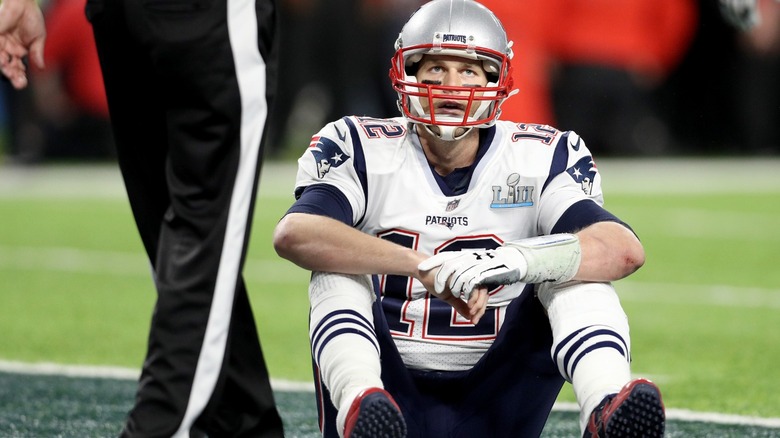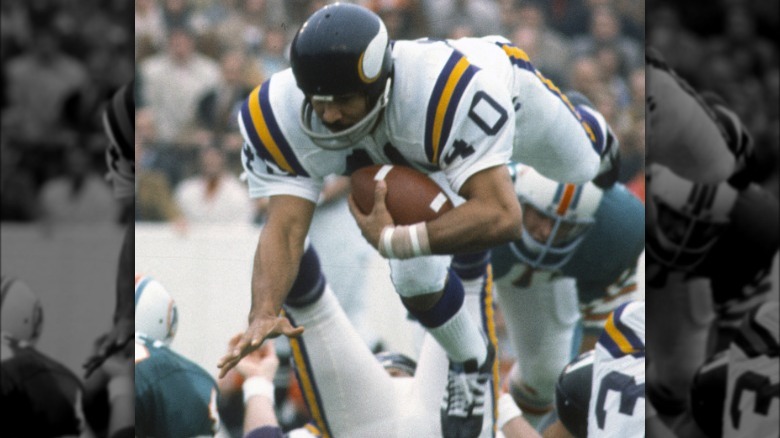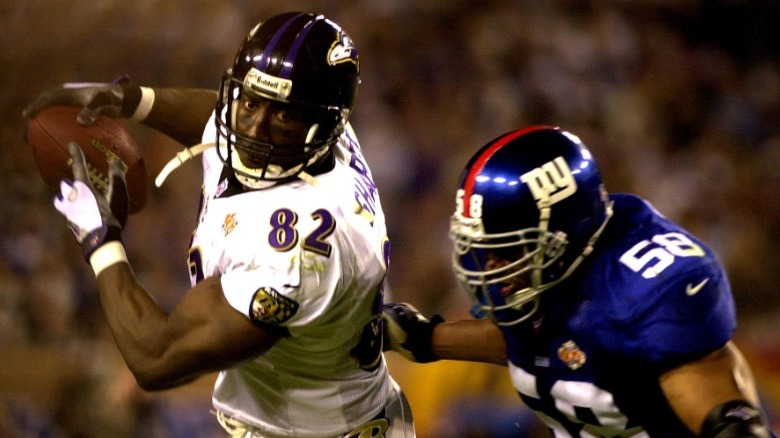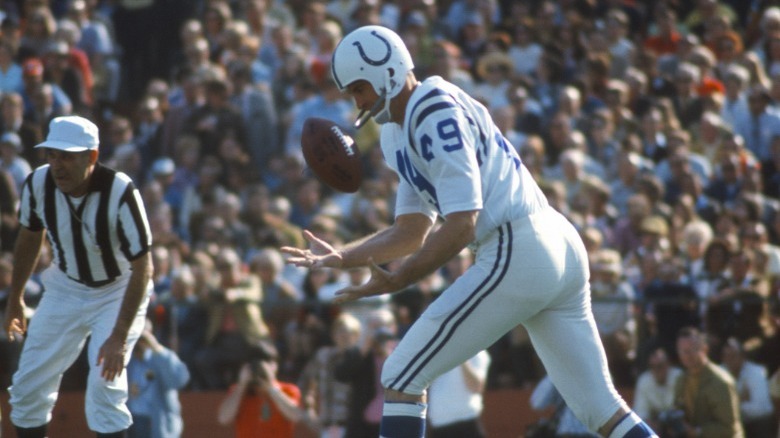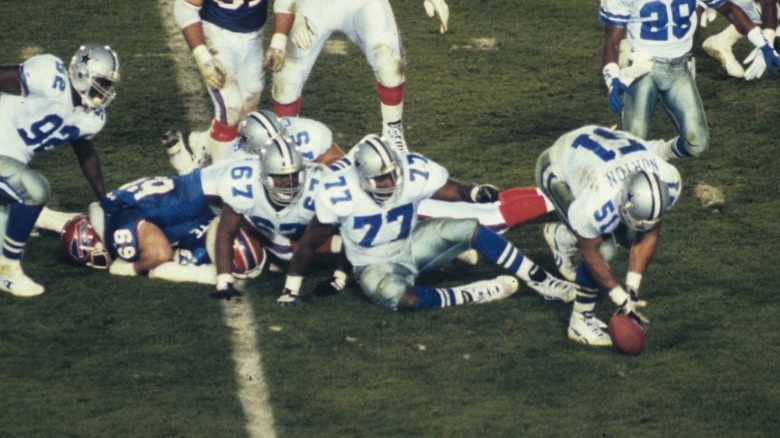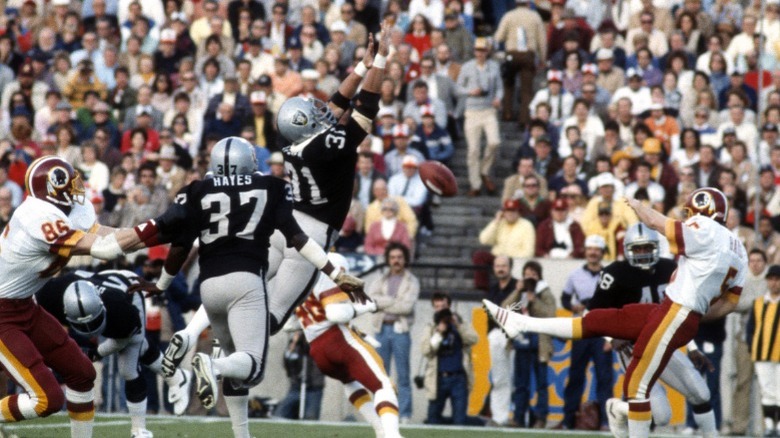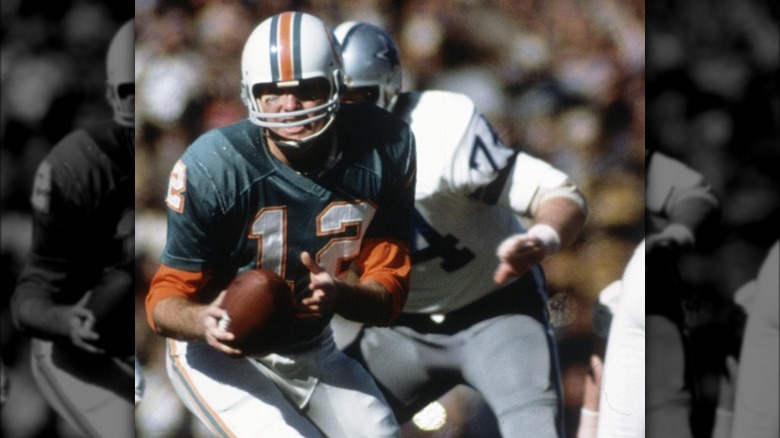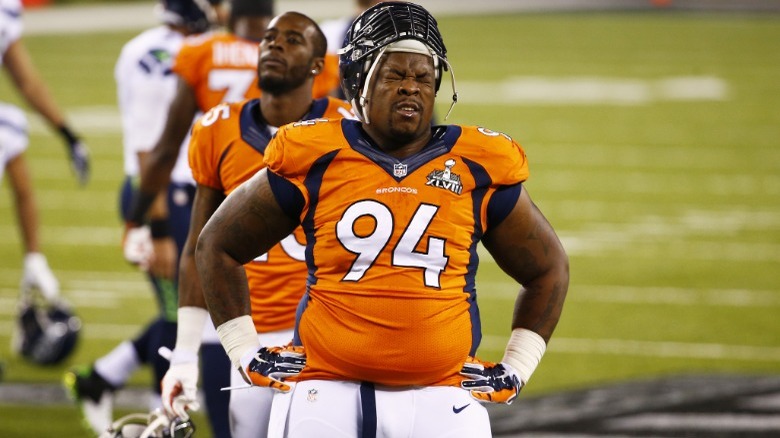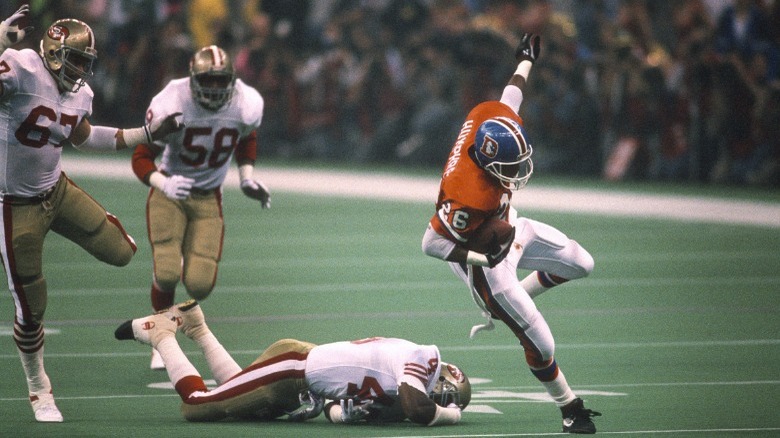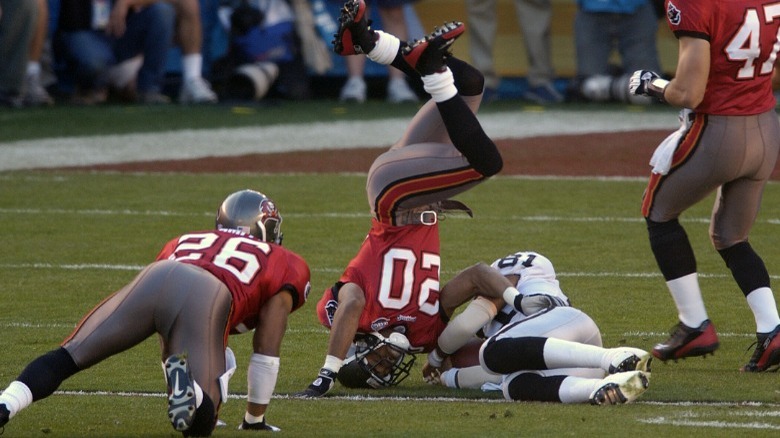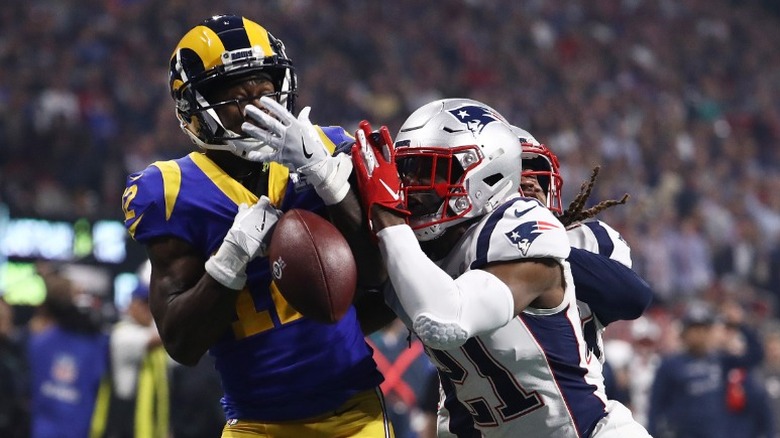The 10 Worst Super Bowls Ever
Every year, the NFL Super Bowl is one of the biggest events on TV. While it may have started off humbly, with the focus solely on the two teams playing the game and the gladiators that made them up, nowadays, it's a two-week spectacle that involves obscene amounts of money and advertisements. The halftime show is now a multi-million dollar affair, and don't even get started on the hype surrounding, of all things, the Super Bowl commercials. For the 2022 Super Bowl, which featured the Los Angeles Rams besting the Cincinnati Bengals, more than 167 million people were watching at one point or another, with an average viewership of more than 112 million (via NBC Sports).
Over the years, there have been some fantastic games. From John Elway's helicopter dive during Super Bowl XXXII that helped bring the Denver Broncos their first Super Bowl win, to David Tyree's helmet catch in Super Bowl XLII that cemented one of the most legendary fourth-quarter comebacks in history, there have been no shortage of highlight moments.
However, there have also been some real snoozefests. Some of the games have been about as interesting as watching paint dry, either due to complete domination or mutual ineptness. Featuring double-digit turnovers, double-digit blowouts, and record-breaking futility, these are the 10 worst Super Bowls ever.
Super Bowl VIII (1974)
Super Bowl VIII took place on January 13, 1974, and featured the Miami Dolphins taking on the Minnesota Vikings. On the heels of their undefeated season in 1972, the Dolphins were playing in their third Super Bowl in a row. It was a battle of Hall of Fame coaches, as Don Shula led the Dolphins and Bud Grant was in charge of the Vikings.
Though it should have been a close game, the Vikings were never in it from the beginning, and it was hardly exciting. For starters, Dolphins quarterback Bob Griese only threw seven passes for a total of 73 yards and zero touchdowns, as running back Larry Csonka did pretty much all of the work by himself with 33 carries. The Vikings failed to get on the scoreboard until the fourth quarter, at which point they were already down 24–0.
As The New York Times reported, even when the Dolphins made mistakes it didn't matter. On one play, Griese forgot the snap count and had to be filled in — wrongly — by running back Csonka, but they still scored on the play. On another play, they only had 10 men on the field, and on yet another play, Csonka ran into his own offensive lineman — yet again still managing an eight-yard gain. Incredibly, the Vikings' loss happened even after a group of California astrologers, headed by spiritual leader Sister Rainbow, had predicted victory for Grant and company.
Super Bowl XXXV (2001)
While Baltimore Ravens fans undoubtedly had a good time watching them destroy the New York Giants in Super Bowl XXXV, for everyone else it turned out to be a display of complete offensive ineptitude. Facing the stifling Ravens defense, the Kerry Collins-led Giants barely even put up a fight. Collins completed less than half his passes for just over 100 yards, with zero touchdowns and four interceptions — the last of which tied a Super Bowl record (via The New York Times).
As a team, the Giants managed less than 150 yards of total offense, and they did not even score an offensive touchdown. Their only points were from a kickoff return, which had taken place following a Collins interception being returned for a touchdown by the Ravens. Yet, the Ravens even countered the Giants' kickoff return touchdown with one of their own, and that was the only time the game was in any jeopardy of actually being close.
To make things worse for Giants fans, the team had steamrolled the Minnesota Vikings in the NFC Championship game, leaving expectations very high for the Super Bowl. While things may have turned out differently had Jessie Armstead's touchdown on a Trent Dilfer interception not been called back for defensive holding, in the end, this was one of the least exciting Super Bowls of all time.
Super Bowl V (1971)
Among Super Bowl teams, the performances by the Baltimore Colts and Dallas Cowboys in Super Bowl V are among the worst in history. The Colts, for their part, managed to turn the ball over a whopping seven times, with four fumbles and three interceptions (via Pro Football Reference). The Cowboys, determined to mimic the Colts' ineptitude, had three interceptions of their own, a lost fumble, and put up no more than 225 total yards of offense.
As The Washington Post pointed out, the six combined interceptions were a Super Bowl record, making it essentially a "hijacking contest." Neither quarterback completed more than half of their passes, and the game's leading rusher had all of 65 yards on the ground. Dallas punted a total of nine times for 377 yards — more yards than either team had offensively the entire game. They also had 10 penalties for 133 yards, even though they were led by legendary head coach and disciplinarian Tom Landry.
The only excitement came in the game's waning moments. Colts' rookie punter Jim O'Brien kicked the game-winning field goal with just five seconds on the clock, putting them ahead of the Cowboys by three points. The only way to sum up the game is in two words: terrible football.
Super Bowl XXVII (1993)
You expect the Super Bowl to be a relatively close affair, considering the two best teams in each league are supposed to be playing. Yet, Super Bowl XXVII between the Buffalo Bills and the Dallas Cowboys was anything but competitive, as the Cowboys walked away with the victory, a 52–17 thrashing of the Bills. What's worse for the Bills Mafia, it was their third consecutive loss in as many Super Bowls (as reported by The New York Times).
The Bills turned the ball over an incredible nine times, leading to two defensive touchdowns and two offensive touchdowns from the Cowboys. Interestingly, the Bills actually got out to a quick 9–0 lead, before consecutive turnovers quickly put Dallas on the right side of the scoreboard. Bills quarterback Jim Kelly was injured in the second quarter and didn't return, leaving backup Frank Reich to take his lumps against the powerful Cowboys defense, which included two interceptions.
Even Bills' all-star running back Thurman Thomas couldn't get going in the game. During the season, he was one of the best offensive players in the NFL, but during the Super Bowl, he couldn't muster hardly anything, accounting for just 19 yards on the ground. The Bills' defense allowed the most points in Super Bowl history, one of the team's many records in futility. The game is also famous for Leon Lett's showboating touchdown, which is considered one of the worst plays in Super Bowl history.
Super Bowl XVIII (1984)
Judging by The Washington Post referring to Super Bowl XVIII as "the most one-sided game in 18 years of Super Bowls," you can probably tell Washington never really had a chance against the Oakland Raiders. Even though the team had the top-ranked offense in the league, they were no match for the Raiders' defense, which smothered them the entire game. The Raiders used tight man-to-man coverage to completely shut down Washington's passing attack, and even Hall of Fame quarterback and football legend Joe Theismann could not come up with an answer.
Theismann completed less than half his passes and threw two interceptions and zero touchdowns. After the offense's one touchdown, the kicker even missed the extra point. Part of their horrendous performance was likely caused by the 20 mph winds that afternoon, but even if it was a calm day it's doubtful Washington would have been able to muster much of anything. They even had a punt blocked that resulted in a Raiders touchdown.
Washington had won the Super Bowl the previous season and came in with huge expectations but left having experienced their most lopsided loss in nearly five years. According to the Raiders' defense, they could sense Washington's frustration and fear, and they never gave them a chance to get back into the game, crushing them for four quarters and destroying the fans' hope for a close game.
Super Bowl VI (1972)
A year after their defeat in one of the most error-filled Super Bowls in 1971, the Dallas Cowboys made it back to the big game a year later, but it wasn't any more exciting. This time, however, the Cowboys found themselves victorious after defeating the Miami Dolphins 24–3 (via The Washington Post). The Dolphins never stood a chance, as they gave up over 250 yards on the ground, setting a Super Bowl record for futility. Dolphins' defensive end Bill Stanfill put it quite succinctly when he said "they drove the ball down our throats."
The Dolphins put up less than 200 yards of total offense and had three turnovers, and they couldn't even muster an offensive touchdown (per Pro Football Reference). Their receivers also had serious issues holding onto the ball, as several of them had crucial drops that would have likely led to touchdowns. Paul Warfield in particular played abysmally, dropping a whopping six passes during the game.
Cowboys quarterback Roger Staubach only had to complete 12 passes the entire game to lead his team to victory, barely topping 100 yards. It wasn't exactly a slugfest (more of a snoozefest), though it did feature many later Hall of Famers, including quarterbacks Bob Griese and Staubach, coaches Don Shula and Tom Landry, and Dolphins' running back Larry Csonka.
Super Bowl XLVIII (2014)
Few Super Bowls were as one-sided as the Seattle Seahawks' destruction of the Denver Broncos at Super Bowl XLVIII. From the first snap of the game, when backup center Manny Ramirez's ball went flying over Hall of Fame quarterback Peyton Manning's head and resulted in a safety, you knew the Broncos were in trouble (per The New York Times). Going into the game the Broncos had the highest-scoring offense in league history, yet by the end of the first quarter they had all of zero points and 11 total yards.
Manning had two interceptions returned for touchdowns, and though he passed for 280 yards, the Seahawks' vaunted defense made him uncomfortable from the get-go. He finally threw for a touchdown in the waning moments of the third quarter, his only one for the entire game. Down 22–0 at halftime, the proverbial nail in the coffin came with Percy Harvin's kickoff return of a touchdown to open the second half, putting the Broncos behind 29–0.
With a margin of victory of 35 points, it's safe to say no one predicted the Seahawks' offense, led by a young Russell Wilson — who would become the Broncos' quarterback nine seasons later — would so thoroughly outplay a Manning-led offense. Yet it happened, much to the dismay of Broncos fans. Terrence Knighton's (pictured above) expression says it all.
Super Bowl XXIV (1990)
The Denver Broncos have certainly had their fair share of Super Bowl blunders, but it's hard to say any were worse than their 55–10 shellacking at the hands of the San Francisco 49ers at Super Bowl XXIV. Calling the game a "debacle" for the Broncos' defense and describing them as "humiliated" and "manhandled," The New York Times highlighted just how dominant the 49ers' offense was. Hall of Fame 49ers' quarterback Joe Montana threw for nearly 300 yards and five touchdown passes, the latter of which was a Super Bowl record, and he managed to avoid any turnovers.
The Broncos were completely outplayed from the beginning, managing only a field goal in the first half and facing a 24-point deficit by the third quarter. Broncos quarterback and Hall of Famer John Elway, was ineffective, throwing two costly interceptions on consecutive drives in the second half, both of which resulted in 49ers touchdowns and put the Broncos down 41–3.
The 49ers continued their onslaught, scoring another two touchdowns to the Broncos one, finishing the game with a 45-point margin of victory — another Super Bowl first. Maybe it was too much to ask for Elway to compete with Montana in the Super Bowl, as Montana won his third Super Bowl MVP award. Eventually, Elway would find success in the late-'90s with his own Super Bowl MVP, but the loss against San Francisco will always be remembered for its futility and disappointment.
Super Bowl XXXVII (2003)
Boasting the number one ranked offense in the league, the Oakland Raiders probably expected a tight and competitive game in Super Bowl XXXVII against the Tampa Bay Buccaneers. Boy were they wrong. The Bucs stampeded over the Raiders 48–21, in a game that saw the Raiders' offense completely stifled from beginning to end (per The New York Times). Quarterback Rich Gannon tossed a Super Bowl record five interceptions, and described the team's performance as running "into a buzz saw."
Ironically, the Buccaneers were coached by Jon Gruden, who was the Raiders' former coach until they traded him away to Tampa Bay at the beginning of the season. The Bucs were leading by 34–3 when they finally let off the gas, but by then it was clear to the few still paying attention that the game was already decided. Oakland tried to rally with three consecutive touchdowns near the end, but that only made the box score look less miserable and hardly indicated the Raiders were still in the game.
Two of Gannon's interceptions occurred in the final two minutes of the game, and both of them were returned for touchdowns. This Super Bowl was about as unwatchable as they come for those wanting actual competition. Unless of course, you're a Bucs fan, in which case it was 60 minutes of glory.
Super Bowl LIII (2019)
By far, the most disappointing Super Bowl in recent history was the bore fest that was Super Bowl LIII, which saw the New England Patriots edge out the Los Angeles Rams 13–3. It featured the fewest offensive points in Super Bowl history, which is incredible considering it featured Tom Brady, one of the most prolific quarterbacks to ever play the game (via The Washington Post). Brady failed to record a touchdown during the game, as running back Sony Michel was the lone player in the game to reach the end zone — for either team.
Though this was the Patriots' sixth Super Bowl victory, it was unarguably their least impressive. Defensively, they played well, limiting Jared Goff to zero touchdowns and completing only half of the passing attempts. The Rams only had two first downs in the entire first half and were unable to get anything going either on the ground or through the air.
The leading scorer of the game was Patriots' kicker Stephen Gostkowski, who had three field goals for nine points. Rams punter Johnny Hekker punted for more yards than the Rams offense managed, including six in the first half alone (via Pro Football Reference). The Rams also committed nine penalties in the game and converted less than 25% of their third down conversions. For the fans, just making it to the end of the game was an accomplishment, as it had basically zero offensive action the entire four quarters.
